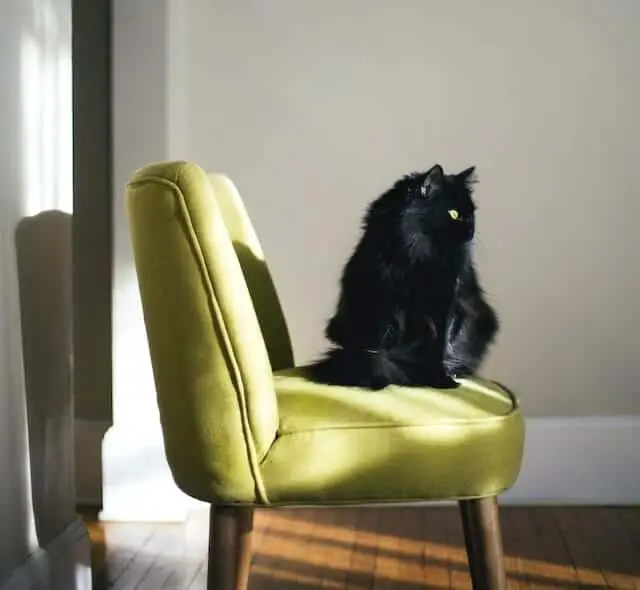If you own a cat and are a fan of Bath and Body Works Wallflowers, you may have wondered whether these popular air fresheners are safe for your feline friend.
Unfortunately, the answer is no.
There are some serious concerns that Wallflowers are toxic and harmful to cats and other pets, here’s what we know about them:
Contents
Can you have wall plug-ins with cats?
While wall plug-in air fresheners may be convenient and effective at eliminating unpleasant odors, they can be toxic to cats and other household pets.
This applies to Wallflowers just as much as other brands.
Many of these products contain essential oils, fragrances, VOCs, and other chemicals that can be harmful if ingested or inhaled by animals.
As a rule of thumb, I just don’t use plugins at all, even if they say they’re safe to use around pets.
It’s up to you, however, to decide what is best for your particular situation.
Related – Is your Bath and Body Works Wallflower too strong? Here’s what to do!
How to use plugins safely with cats in the home
If you do decide to use wall plug-in air fresheners in your home, there are a few steps you can take to reduce the risk of harm to your cat:
- Keep the air fresheners out of reach of your cat. This means placing them high up on a wall or in a cabinet that your cat cannot access.
- Follow the instructions on the product label and do not exceed the recommended usage. Overuse of air fresheners can increase the risk of toxic exposure.
- Place them in rooms where your cat doesn’t typically hang out. This will help to reduce the exposure of your cat.
- Consider using natural alternatives to synthetic air fresheners. Ultimately, there are plenty of alternative ways to get your home smelling fresh that aren’t potentially toxic, such baking soda and other natural products.
Overall, while Bath and Body Works Wallflowers may be a popular air freshener among humans, they can be dangerous to cats and other pets.
If you do have a cat in your home, it is best to stick to natural products or, better yet, avoid air fresheners altogether.
Your furry friend will thank you!
Signs your cat is suffering toxicity poisoning
If you suspect that your cat has been exposed to toxic levels of an air freshener or any other household product, it is important to seek medical attention immediately.
Some signs that your cat may be suffering from toxicity poisoning include:
- Difficulty breathing
- Vomiting or diarrhea
- Drooling
- Loss of appetite
- Depression or lethargy
- Seizures
I’m not a vet so I can’t comment on exact symptoms or the amount of exposure that is dangerous, but if you see any signs of illness with your cat it’s time to shut off the plugin!
What are VOCs?
You may have heard or seen of the abbreviation VOC being used when talking about air fresheners and plugins.
VOCs, or volatile organic compounds, are chemical compounds that evaporate into the air and can be toxic to humans and animals alike.
VOCs are found in many common household products such as air fresheners, paint, cleaning supplies, and even furniture.
When using any of these products, it is important to read the labels and follow the instructions precisely.
Phthalates, formaldehyde, and other chemicals are known to be common VOCs found in air fresheners, so always check the labels to ensure your safety.
Related – Tips for using candles and essential oils safely around your pets.
Are Wallflowers toxic to all animals?
In addition to cats, wall plug-in air fresheners can also be toxic to other household pets such as dogs and birds.
As with cats, it is best to keep these products out of reach and to follow the instructions on the label.
If you suspect that any of your pets are suffering from toxicity poisoning, seek medical attention immediately.
Summary
To summarize, Bath and Body Works Wallflowers and other air fresheners are not safe for cats or other household pets.
You may have been using them for years without issue, and that’s great if you have.
But with the mounting evidence we now have available that suggests plugins and other air fresheners might be doing harm to pets, I suggest trying to find other safe solutions or avoiding the use of plugins altogether.
If you do choose to use these products in your home, be sure to follow the instructions on the label and take precautions to keep them out of reach of your pets.
If you suspect that your cat has been exposed to a toxic substance, seek medical attention as soon as possible.
Image credits – Photo by Kari Shea on Unsplash

I’m a MA, (CMT) Certified Massage Therapist, Licensed Massage Therapist (LMT), and Reiki Master — I’m a licensed massage therapist with over 10 years of experience in the industry.

